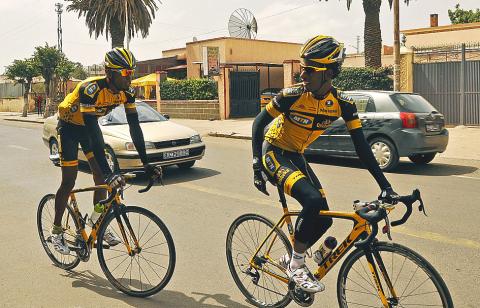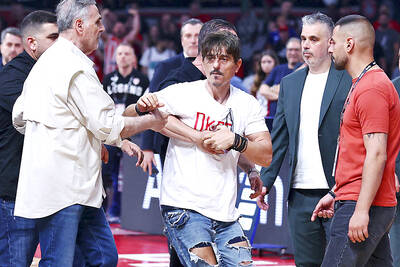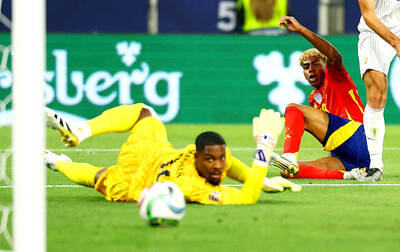When Eritrean cyclist Natnael Berhane crossed the finish line of the Tour of Turkey in May, he made history not only for his country, but for his continent.
Natnael, 22, who is expected to take first place after the winner was disqualified for doping, was the first person from sub-Saharan Africa to win a race of that class.
However, he is only one of several Eritreans in the cycling-mad Horn of Africa state that is making his mark on the sport, showing another side of a nation that makes headlines more for brutal repression than world-class athletes.

Photo: AFP
Eritrea offers ideal training ground for serious cyclists, with its breathtaking, cliff-hugging roads that swoop from the highland capital, Asmara — elevation 2,325m — in a 100km stretch down to the Red Sea.
“When I race in Europe, the aim is to introduce our country to the world,” professional cyclist Meron Russom told reporters, sporting the bright yellow gear of his South African-based MTN Qhubeka team ahead of a training session.
“We are still fighting to push Eritrea to the top in sport, especially cycling,” added the slender 26-year-old, a former winner of the Tour of Eritrea, a race modeled on the more famous Tour de France.
Eritrea’s competitive cyclists have zoomed forward in recent years, boosted by a training center set up in South Africa by the International Cycling Union (UCI) in 2005.
“They’ve never had the opportunity … in trying to move them into the higher arena of cycling, until the UCI set up a satellite training center in South Africa,” UCI president Pat McQuaid said.
The tradition of cycling in Eritrea dates back more than a century, when Italian colonizers introduced the sport.
Though international races were hosted in Eritrea, it was not until the late 1940s that Eritreans were permitted to ride competitively alongside their Italian occupiers.
Today, cycling is an integral part of life as cars compete with bikes — the day-to-day transport for many — on the capital’s roads and the groups of youths who take to the high-altitude routes alongside professional racers each weekend continue to grow.
The sport suffered during the three decades of war that won Eritrea independence from Ethiopia in 1991, cyclist Giovanni Mazzola said.
“Before independence it was bad, because the war continued, the people could not go out,” said Eritrean-born Mazzola, who competed for Ethiopia in the 1960 Rome Olympics.
Today, the country boasts six professional riders who compete internationally and more than 650 cyclists in its national cycling federation.
However, the sport is hampered by lack of funding for equipment and limited local training programs.
“Funding is a problem, it is not enough,” Eritrean Cycling Federation president Asmerom Habte said, sitting in his office next to a handful of cycling trophies.
Asmara helps buy some professional bicycles, while top riders are supported by sponsors, but obtaining travel visas to compete abroad adds another challenge since the hardline regime restricts travel, even for national athletes. This has not been helped by the defection of several national athletes.
Olympic runner Weynay Ghebresilasie defected after the 2012 London Games, in December last year, Eritrea’s soccer team disappeared in Uganda and at least two more cyclists have defected so far this year.
“We have had one or two who have come and disappeared, which doesn’t help the ones who are trying to get in after that,” McQuaid said.
Yet the mood remains optimistic that the sport will continue to grow here.
Many of the country’s professional cyclists, Meron included, prefer to return home to train in the country’s high altitude, temperate weather and varied terrain good for both mountain biking and road racing, which some feel gives Eritreans a competitive edge over other African riders.
National pride is anther push for Meron.
Although Kenyan-born Chris Froome won this year’s Tour de France, he carried a British flag. Meron hopes that one day there will be an African — and specifically an Eritrean — winning that most famous of cycle races.
“Here in Eritrea, everybody knows us, when we pass in the road, they call us by our name, so they give us a big boost,” he said. “That’s why we are still racing and riding, because of our people.”

The Greek basketball league finals between Panathinaikos and Olympiakos were suspended by the government on Monday following on-court scuffles involving rival security teams. The best-of-five series is at 1-1. The third game, scheduled for today, has been postponed. The owners of both clubs were summoned to meet with the country’s sports minister. They “will be asked to provide explicit guarantees that this situation will be brought to an end. If not, this year’s championship will be definitively canceled,” government spokesman Pavlos Marinakis said. “There can be no tolerance for such pathological phenomena of violence and delinquency.” In online posts, the owners of Panathinaikos and

The Crusaders yesterday produced a clinical performance in difficult conditions to beat the Queensland Reds 32-12 and claim home advantage in next week’s Super Rugby semi-finals. Lock Scott Barrett and prop Tamaiti Williams scored first-half tries to reward an outstanding performance from the Crusaders’ forwards in wet, slippery conditions and bitterly cold temperatures. Scrumhalf Noah Hotham defied the conditions in the second half to score a superb solo try and, after kicking a conversion and penalty to make the score 22-0 at the hour mark, flyhalf Rivez Reihana scored a try which took the game beyond the Reds. “Typical Christchurch weather, cold, wet

Ryan Yarbrough picked up a dazzling World Series ring from his time with the Los Angeles Dodgers last season. Then he went out and beat them. The New York Yankees starter on Sunday pitched one-run ball over six innings, struck out a season-high five and blanked the Dodgers’ top four hitters in a 7-3 win. “I feel like I’m in a really good place right now and really trying to continue that,” Yarbrough said. “I’m having a lot of fun.” The 33-year-old left-hander made 44 relief appearances between the Dodgers and Blue Jays last season. The Dodgers designated him for assignment on July

Spain starlets Lamine Yamal and Nico Williams dazzled on Thursday as La Roja beat France 5-4 in a thriller in Stuttgart, Germany, to set up a UEFA Nations League final with Portugal. Yamal bagged a brace, while Williams scored and provided an assist as the two wingers cut France’s makeshift defense to ribbons. Mikel Merino and Pedri were also on the score sheet for the UEFA Euro 2024 champions. Kylian Mbappe netted a second-half penalty, but Spain were 5-1 up and cruising, before Les Bleus suddenly woke up as their opponents took their foot off the pedal. France’s three late goals — a